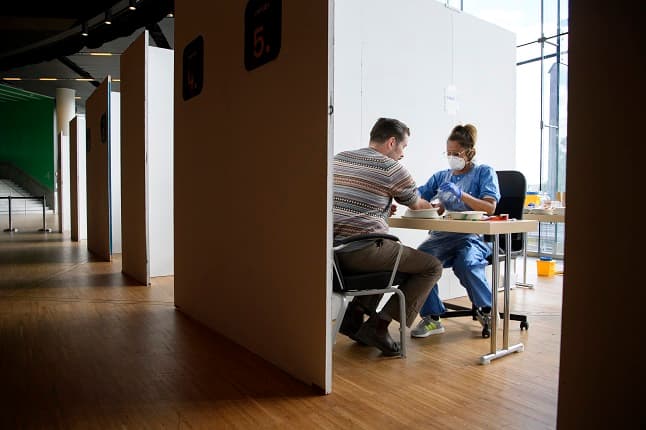Working in Sweden: Can I go back to work as normal if I've tested positive for Covid-19 antibodies?

So, you've received a positive test for coronavirus antibodies, but aren't sure exactly what it means for you. Here's what you should know about returning to the office.
The key piece of advice from the Public Health Agency is that people with coronavirus antibodies should not make any significant changes to their behaviour. That means you still need to follow national recommendations including staying at home if you're unwell, practising good hygiene, and keeping distance from others as much as possible.
A positive antibody test means your body has developed proteins to fight off the coronavirus. Scientists still don't know if catching the coronavirus gives you immunity to re-infection, and if so, how long this would last. The Public Health Agency has said the available studies suggest that people who have recovered from the coronavirus are likely immune to re-infection for at least a few months, but that individuals still need to follow the recommendations.
There's also a margin of error in the tests (especially those carried out privately) and even though it is small, that's worth bearing in mind.

File photo of an empty office in Stockholm. Photo: Jonas Ekströmer/TT
So if you're returning to the workplace, you should continue keeping distance and adhering to other recommendations even if you have tested positive for the antibody.
Your workplace might however use antibody results to make overall planning decisions.
For example, some companies in Sweden have collaborated with testing companies to offer testing to employees, and anonymised data allows them to see what proportion of workers had antibodies, which could be used as a guide to help decide how to start allowing people to return to work.
Another difference is if you work in a role regularly coming into contact with people in high-risk groups, for example the care or healthcare sector.
The Public Health Agency has said that people who have tested positive for antibodies can have close contact with people in risk groups, although this shouldn't be seen as entirely risk-free due to the limited research available. But it's possible that a staffing agency organising home care, for example, would choose to assign work involving close contact with high-risk patients to staff members who have the coronavirus antibodies.
Be aware that your employer can never force you to undergo medical tests or to share your results, unless this is agreed as part of either your workplace collective bargaining agreement or an individual contract between you and your employer.
Yesterday: What should you do if your workplace doesn't feel coronavirus-safe? Coming up tomorrow: Am I entitled to a desk while working from home? If you have any questions about working or living in Sweden, please email our editorial team at [email protected].
Comments
See Also
The key piece of advice from the Public Health Agency is that people with coronavirus antibodies should not make any significant changes to their behaviour. That means you still need to follow national recommendations including staying at home if you're unwell, practising good hygiene, and keeping distance from others as much as possible.
A positive antibody test means your body has developed proteins to fight off the coronavirus. Scientists still don't know if catching the coronavirus gives you immunity to re-infection, and if so, how long this would last. The Public Health Agency has said the available studies suggest that people who have recovered from the coronavirus are likely immune to re-infection for at least a few months, but that individuals still need to follow the recommendations.
There's also a margin of error in the tests (especially those carried out privately) and even though it is small, that's worth bearing in mind.

File photo of an empty office in Stockholm. Photo: Jonas Ekströmer/TT
So if you're returning to the workplace, you should continue keeping distance and adhering to other recommendations even if you have tested positive for the antibody.
Your workplace might however use antibody results to make overall planning decisions.
For example, some companies in Sweden have collaborated with testing companies to offer testing to employees, and anonymised data allows them to see what proportion of workers had antibodies, which could be used as a guide to help decide how to start allowing people to return to work.
Another difference is if you work in a role regularly coming into contact with people in high-risk groups, for example the care or healthcare sector.
The Public Health Agency has said that people who have tested positive for antibodies can have close contact with people in risk groups, although this shouldn't be seen as entirely risk-free due to the limited research available. But it's possible that a staffing agency organising home care, for example, would choose to assign work involving close contact with high-risk patients to staff members who have the coronavirus antibodies.
Be aware that your employer can never force you to undergo medical tests or to share your results, unless this is agreed as part of either your workplace collective bargaining agreement or an individual contract between you and your employer.
Yesterday: What should you do if your workplace doesn't feel coronavirus-safe? Coming up tomorrow: Am I entitled to a desk while working from home? If you have any questions about working or living in Sweden, please email our editorial team at [email protected].
Join the conversation in our comments section below. Share your own views and experience and if you have a question or suggestion for our journalists then email us at [email protected].
Please keep comments civil, constructive and on topic – and make sure to read our terms of use before getting involved.
Please log in here to leave a comment.